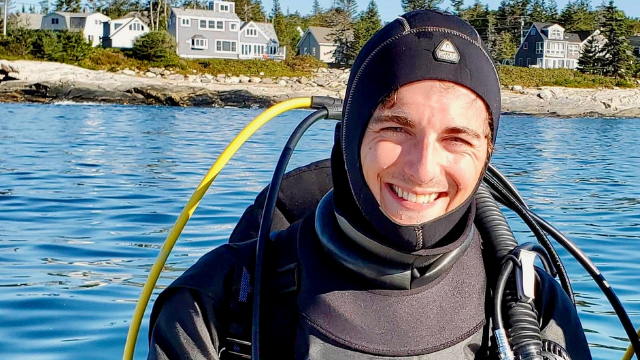
A Tale of Two Coasts: Shane Farrell’s Research on Maine’s Changing Kelp Forests
By Attis Bielecki, ME EPSCoR Student Writer
Shane Farrell is a Ph.D student at the University of Maine focusing on kelp forest ecology. He is advised by Dr. Douglas Rasher, a Senior Research Scientist at Bigelow Laboratory for Ocean Sciences, and Dr. Damain Brady at the Darling Marine Center. Under the mentorship of Rasher, Farrell is studying how climate change is driving community shifts in kelp forests in the Gulf of Maine.
As Farrell explains, “The Gulf of Maine is warming about 98% faster than all the world’s oceans, and kelps are intolerant of warm water.” As a result, the waters in southern Maine are now too warm for kelp, and kelp forests have collapsed in this area.
In stark contrast, lush kelp forests remain common throughout the northern regions of Maine. . “It’s basically a tale of two coasts: in the south, a degraded kelp system that has had small red turf algae take over, versus in the north, a nice lush kelp forest that has been shown to harbor a lot of different animals,” explains Farrell.
To document the arrival of new species and the loss of others, Farrell and other members of the Rasher Lab conduct visual surveys while on SCUBA. While underwater, they count and size fish, lobsters and crabs, as well as measure the abundance and composition of the algal community. As part of the Maine-eDNA program, the Rasher Lab has integrated eDNA analyses into their underwater research. Farrell points out that eDNA is used as a complementary approach that has proven to be useful in finding rare species that are harder to detect with traditional methods.
Farrell finds great enjoyment in this research, especially when it comes to diving. Farrell, Rasher, and others will begin diving again in March and finish in October, some 140 dives later. Farrell describes the diving experience, saying “It’s like you’re in a washing machine sometimes, but it’s always fun to see pollock swim by, or see crabs or lobsters.”
Farrell is excited to be a part of the Maine-eDNA project and to share his research which highlights how climate change is affecting kelp forests.
